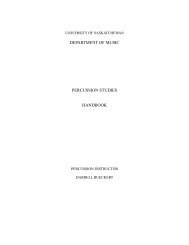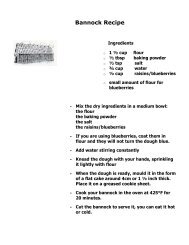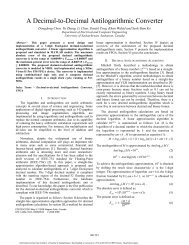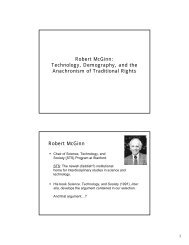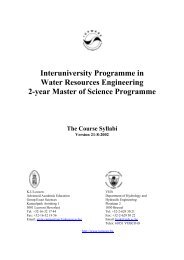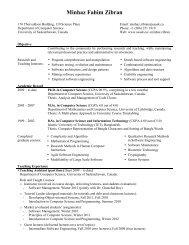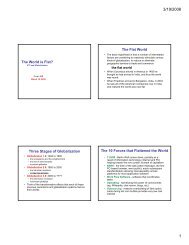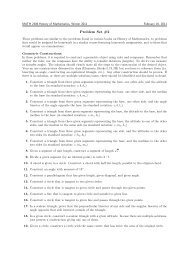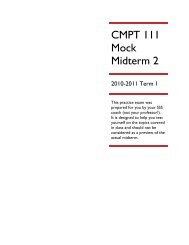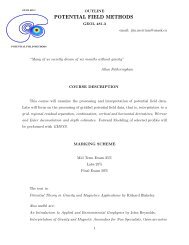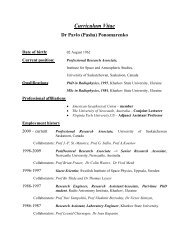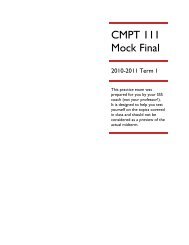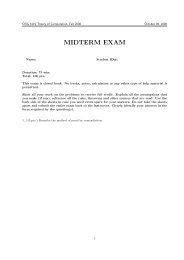PHIL 271: Aesthetics – Assignment #1 - Homepage Usask
PHIL 271: Aesthetics – Assignment #1 - Homepage Usask
PHIL 271: Aesthetics – Assignment #1 - Homepage Usask
You also want an ePaper? Increase the reach of your titles
YUMPU automatically turns print PDFs into web optimized ePapers that Google loves.
(Section 01, T1, 2011)<br />
<strong>PHIL</strong> <strong>271</strong>: <strong>Aesthetics</strong> <strong>–</strong> <strong>Assignment</strong> <strong>#1</strong><br />
______________________________________________________________________________________<br />
Due: October 5, 2011<br />
Weight: 30% of final grade<br />
Length: about 5-7 pp. (1200-1700 words)<br />
Overview<br />
Address ONE of the following topics in an argumentative essay (i.e., an essay which makes one<br />
or more specific claims, supported by reasons). Your essay should be typed, double-spaced,<br />
paginated, free from grammar and spelling errors and, in general, as well-written as you can<br />
make it.<br />
This assignment is mainly intended to help you solidify your grasp of the classical aesthetic<br />
theories that we have been discussing in the first few weeks of the course. Accordingly, your work<br />
will be evaluated mainly in terms of how well you explain and examine those theories in their own<br />
terms. (The next assignment will open up wider possibilities, such as comparing or synthesizing<br />
different theories or theorizing from your own experience.) That said, the topics below may be<br />
interpreted fairly loosely: It is more important to formulate a good, probative thesis than it is to<br />
address every aspect of the question as stated.<br />
In keeping with this aim, your essay should mainly draw on the assigned texts, though references<br />
to other sources are permissible. Proper references should be included for any text or artwork<br />
that you cite in your essay (see the class web site for guidance on documentation formats). It<br />
goes without saying that the rules about academic honesty mentioned in the syllabus apply to this<br />
assignment also.<br />
Please bear in mind that, as the philosopher Geoffrey Payzant once said, “if the writing of your<br />
essay is not a kind intellectual adventure for you, the reading of it will be a dull chore for me; the<br />
essay will be a waste of your time and mine.” Feel free to be creative, to be bold (so long as you<br />
do actually offer an argument).<br />
Topics<br />
1) Some aesthetic theorists (Bell, Plato and possibly Aristotle among them) suggest that if<br />
painting, film, sculpture, literature, etc., are all classed as art, then there must be some<br />
common property or set of properties definitive of art which they all share and in virtue of<br />
which they are art. Either a) evaluate this claim by offering reasons for thinking that it is<br />
true or false or (if you think it is true), b) discuss what property (or set of properties) is or<br />
ought to be definitive of art.<br />
2) The ancient Greeks, we are told, did not conceptualize art as something distinct from<br />
ordinary making, but instead thought of art simply as technē or skilled craft. Is this, in<br />
your view, a useful way to think about what we now call “art”? You may find it helpful to<br />
distinguish between artifacts and tools. Specifically, do artworks function as tools (i.e.,<br />
tools used to provoke a certain kind of response) or does their value lie in their value as<br />
artifacts?<br />
…over
3) According to Plato, art is (or can become) dangerous. Discuss Plato’s arguments in the<br />
Republic for controlling the work of imitative artists in and, in some cases, banishing them<br />
from the ideal political community. Are these arguments persuasive? Do Plato’s<br />
arguments for the control and censorship of art have any relevance in the present? In<br />
constructing your account, you may wish to make reference to some of the controversial<br />
artworks discussed in Freeland (especially in chapters 1 and 4) or other similar works.<br />
4) Aristotle claims that “poetry…is a higher, more philosophical thing than history: for poetry<br />
tends to express the universal, history the particular.” Discuss this claim. Is it true? If it is<br />
true, is it generally true of all poetry (or, for that matter, all history) or are there<br />
exceptions? What significance, if any, does this claim have for how we ought to<br />
understand and evaluate artworks? By way of comparison, you may wish to make<br />
reference to the ritual theory of art discussed in Freeland (chapter 1 and passim) and/or<br />
to Shelley’s Defense of Poetry and/or to Nietzsche.<br />
5) Hume suggests that we will know if our taste is functioning properly if our critical<br />
judgments about art are consistent with the judgments of other nations and ages. Is<br />
Hume’s argument for this claim persuasive? Is it consistent with the rest of Hume’s<br />
theory? Is it consistent with your own experience?<br />
6) When Kant says that genius is a talent for producing that for which no definite rule can be<br />
given, he is implicitly taking up a stand against the imitation theory of art. Discuss Kantian<br />
arguments against the imitation theory.<br />
7) Some aestheticians (e.g., Bell, Bullough, Kant) argue that some degree of<br />
disengagement for our ordinary desires and feelings is required in order to achieve a<br />
genuinely ‘aesthetic’ experience. Discuss and evaluate the idea of disinterestedness<br />
and/or psychical distance.<br />
8) What is Shelley defending poetry against? Is his defense persuasive?<br />
9) Narrative, says Nietzsche, is fable grounded in a conceit, the conceit being that we put<br />
ourselves at the centre of meaning (i.e., at the centre of the story). But this conceit is an<br />
inescapable lie in as much as it is necessary for our survival. Discuss Nietzsche on the<br />
possibility of art and on the possibility of leading an artistic life.



